Millennials Don’t Know Much About The Holocaust
A plurality of Americans aged 18 to 34 have no idea how many people were killed, what Auschwitz was, or how Hitler came to power.
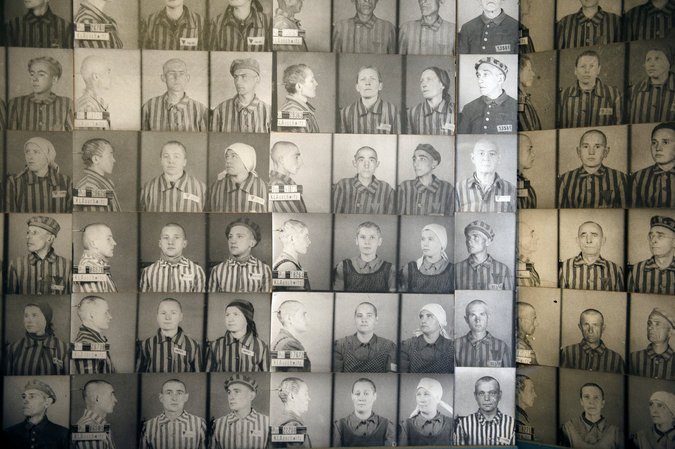
NYT (“Holocaust Is Fading From Memory, Survey Finds“):
For seven decades, “never forget” has been a rallying cry of the Holocaust remembrance movement.
But a survey released Thursday, on Holocaust Remembrance Day, found that many adults lack basic knowledge of what happened — and this lack of knowledge is more pronounced among millennials, whom the survey defined as people ages 18 to 34.
Thirty-one percent of Americans, and 41 percent of millennials, believe that two million or fewer Jews were killed in the Holocaust; the actual number is around six million. Forty-one percent of Americans, and 66 percent of millennials, cannot say what Auschwitz was. Only 39 percent of Americans know that Hitler was democratically elected.
“As we get farther away from the actual events, 70-plus years now, it becomes less forefront of what people are talking about or thinking about or discussing or learning,” said Matthew Bronfman, a board member of the Conference on Jewish Material Claims Against Germany, which commissioned the study. “If we wait another generation before you start trying to take remedial action, I think we’re really going to be behind the eight ball.”
Despite the gaps in the respondents’ knowledge, the study found an overwhelming consensus — 93 percent — that all students should learn about the Holocaust at school. And Holocaust denial remains very rare in the United States, with 96 percent of respondents saying they believe the genocide happened.
“The issue is not that people deny the Holocaust; the issue is just that it’s receding from memory,” said Greg Schneider, the executive vice president of the Claims Conference, which negotiates restitution for Holocaust victims and their heirs. “People may not know the details themselves, but they still think it’s important. That is very heartening.”
This really shouldn’t be that surprising. The Holcaust a very long time ago; my nearly 75-year-old mother wasn’t born when it began. A whole lot of very important history has happened since meaning textbook writers and curriculum developers constantly need to edit the past to make room for more recent information. Further, there’s a firehose of information coming out by the nanosecond on current events, which naturally competes with time and attention that can be devoted to reading history or even watching documentaries.
One presumes the Holocaust is still being taught. Anne Frank’s diary is likely still part of social studies curricula. But I’m sure it’s given less attention now than when I was in school. Presumably, that’s true of a whole host of things: ancient history, the Colonial era, the War of 1812, World War I, the moon landing, Vietnam, Watergate, and the Cold War.
I’m not quite sure how one could have escaped knowing that Hitler was more-or-less democratically elected, given how often it’s referenced in contemporary debates about US politics. Then again, most people don’t follow those debates to nearly the extent I do.

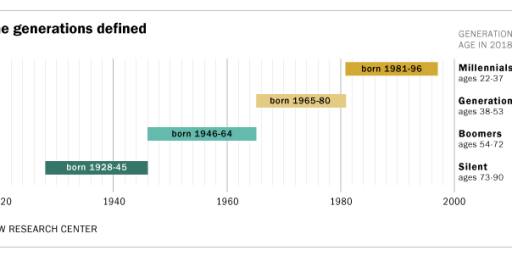
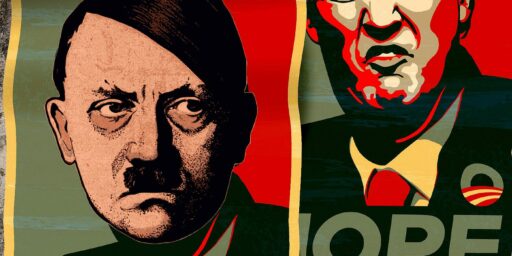
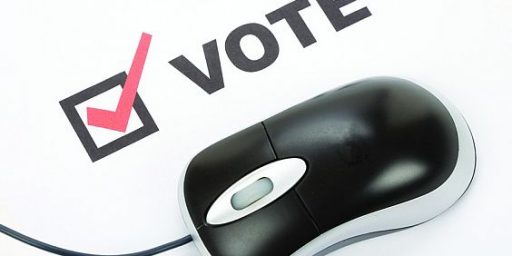

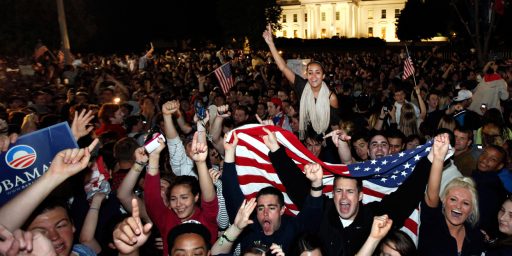
Can we point out that Hitler didn’t win the popular vote either?
@Mu:
Yeah…but did he ever pay a porn star hush-money?
Two of Hitlers lovers committed suicide, another died of complications eight years after a suicide attempt, and one failed at their suicide attempt. It’s surprising that more women, that have slept with Dennison, haven’t committed suicide.
A fair point, but it strikes me that this is more an indictment of school curricula than it is an explanation. Yes, space must be made in a history course for all sorts of events, but there are some things that are arguably unique enough to human history that skipping over or minimizing them is at the very least a grave mistake. The Holocaust would arguably be at the top of that list.
Not surprising at all.
Americans tend to be uninformed about most history unless they are actively studying it, or unless they lived through the events and period under question.
Also, we now have an Administration that is sympathetic to our White Nationalist constituents.
It sounds like a lot of “millennials” never had the opportunity to hear a Holocaust survivor discuss the Holocaust (even sanitized a bit depending on the age of their audience) in something like a classroom setting.
Granted, I am now 46 and do not remember the minute details of the visit, but I do still have a memory of when a Holocaust survivor came to a classroom I was in. In fact, it may have been when I was in Elementary school when this event took place. It is not too late to introduce students to this extremely unfortunate historical event, so perhaps this news will serve as a clarion call that we need to make sure the future leaders of tomorrow (aka the youth in the U.S.) do not forget the past.
This is one of those situations where a whole new generation should be reminded that those who forget the past are doomed to repeat it, something that has already happened to a lesser degree with the Rwandan massacre of Tutsi’s. This ignorance of the Holocaust can be mitigated with a bit of a renewed push by society to keep folks educated about the past.
This effort to keep millennials aware of the past should be on all of society’s shoulders not just the ones of our educators in grade school and college.
@Doug Mataconis:
Maybe….but I didn’t learn very much about the holocaust in high school, either. History was taught sequentially, and even in my AP US History class, we barely got out of the Civil War.
Maybe it’s a failure of pop culture?
FWIW, at least one of my kids read The Boy in the Striped Pyjamas a couple of years ago (a novel about a kid in a concentration camp).
We hosted a Holocaust Survivor here at Troy University recently (I think it was was in the Fall, although it may have been last Spring).
This does not strike as horrible, as far as it goes. While 2 million is far less than 6, we are still talking millions.
That strikes me as more worrisome.
ARG! He actually wasn’t democratically elected–he was appointed by President Hindenberg to be Chancellor. He wasn’t elected. I have written about this before.
So, yes: Hindenberg was elected, and there were elected Nazis in the Reichstag, Hitler himself was never elected to anything.
At some point, history stops being important lessons and becomes dry dusty facts. How many massacres have happened in our world that the general population don’t even know about, let alone can cite important facts? How many tragedies are now just footnotes? The Taiping Rebellion killed almost 3o million in the 1850-60s and it gets barely if any time in history class. Promise you millennials will know even less about it. Mass death and industrialized evil only hold unto the imagination until the next horrible act in the story is written.
Some day in the future, they’ll hold a poll that states most of the newest generation doesn’t know basic facts about 9/11 and how many died. They’ll have some vague notion it was an attack and it started something – if we’re lucky, they’ll connect the numbers to the date and remember the city. The media will moan and weep about today’s ill-educated youth and then go back to the tragedy du jour.
@James Pearce: I suspicion it’s because as weeks go on and on the teacher slips behind more and more in the syllabus, so the last day before exams is where everything from WWI onwards ends up landing, and the kids anyway want to ask more about what topics will be on the exam. So the teacher gives up, thinking “oh well, they’ll pick up all the important stuff from movies such as Dunkirk, anyway.”
At least that’s my cynical impression, based on my own experiences. In my case, the teaching of history managed to reach WWII….just barely at its last gasp. I didn’t even KNOW we had had a Korean War until I met the father of one of my college friends, who had fought in it.
@Steven L. Taylor: Fair point on 2M vs 6M. And, yes, while I remembered that Hitler wasn’t elected through normal processes, I’d forgotten just how irregular his appointment was. (Not sure where the images from that 2010 post went.)
@KM: Fair points all but it’s not surprising that we care more about a Holocaust in Western Europe than a civil war in China. (Indeed, I doubt they teach much about the Great Leap Forward, which was far more recent, in our schools, either.)
I am 57 years old, never read Anne Frank’s Diary, but my experiences include a visit to Auschwitz in 2000. It is the bleakest place I have been to. My late half-sister married a Jewish man and converted. Her mother-in-law is a Holocaust survivor. She is 94 and still alive.
Currently I am writing my next ebook (I have 23 at Amazon and make a modest living from them.) which has plot set partially in Israel (During the early and mid 1990’s) and l have one Holocaust survivor in it and other people who had parents etc who did survive it and some who who didn’t.
The Holocaust happened 16-20 years before I was born but I know what happened.
I was born in 1948.
Baby Boomer.
Long Haired Hippie Freak.
Sex and Drugs and Rock and Roll
I hope I die before I get old!
I know that Crispus Attucks was the first American killed in the American Revolution. However I didn’t learn that in grade school. There’s a park here in Sleepytown on the NorthEast Side named after him.
I remember something about Washington crossing the Delaware on Christmas Day in a terrorist?/guerrilla? suprise attack on the Hessians.
And who can forget Cornwallis surrendering at Appomatox.
That’s about all I know about the American Revolution.
But I think I’m just smarter those Millennials and I don’t even know who they are.
@James Joyner: I think they may have been hosted at PoliBlog, which is in internet heaven.
@grumpy realist:
I never understood why the syllabus needed to start with the explorers, though. Every year, we got to hear all about John Cabot and Henry Hudson and Vasco De Gama. Truly useless and absolutely trivial information.
Meanwhile, the crucial events that shaped the century we actually lived in was left up to Seinfeld and Spielberg. I hope things have changed. But I doubt it.
I’m not sure this is as damning as we oldsters might think. I’m 57. WWI was the most horrific event for hundreds of millions of my grandparents contemporaries. But a few years after studying it I would be hard pressed to have gotten the specifics right. No one close to me fought in it, so I didn’t get stories. WWII was a generation later and I had children late so the time lapse is roughly the same for them and the Second World War as for me and the first. My children’s grandfather fought in WWII, but he’s been deceased for ten years.
@Mister Bluster:..I’m just smarter those Millennials and I don’t even know who they are.
I guess if I would have read the post word 4 word instead of just scanning it I might have caught the “18-34” item.
If you ever offer a programmed learning course on how the moderation filter works I will read that.
Get politicians and parents and all the other meddlers – including the backward twats in Texas who dominate textbooks – and let storytellers tell stories.
I’ve held audiences of hundreds of kids spellbound talking about WW2. It’s not that hard, it’s just hard the way we do it. Let me design my own curriculum and use my own methods and I guarantee you I can teach a class of 6th graders more history, and have them retain more of it, than any teacher hamstrung by the enforced boredom of history classes. History is a story, it’s not an equation, it’s not a skill, it’s a story.
Your comment is awaiting moderation.
@Mister Bluster: ..I’m just smarter those Millennials and I don’t even know who they are.
I guess if I would have read the post word 4 word instead of just scanning it I might have caught the “18-34” item.
(must be the name change that snags posts)
When I was in college in the early 2000s, one time I mentioned to a girl that my grandparents were Holocaust survivors, and she said, “Did they know Anne Frank?”
In 2010 during one of his anti-SSM rants, Carl Paladino said, “During World War II, all decent people were angry at Hitler’s extermination of six million Jews in the gas chambers of Auschwitz.”
Whenever I hear comments like those ones, it occurs to me that a lot of people know about the Holocaust only through the superficial soundbites they’ve picked up over the years. They know there was, like, this bad dude named Hitler who, like, killed lots of Jews, and one of them was, like, Anne Frank, and there were, like, gas chambers and, like, something called Auschwitz.
In fact people are like this with much of history. You see the same kind of cartoonization with the Civil Rights Movement, for example. And it’s even truer of events far enough in the past that no one alive today was around back then. You know how many Americans cannot correctly identify even the half-century in which the Civil War took place? It was always destined to happen with the Holocaust. Time moves on. People die out, the present becomes the past. My grandmother just passed away last year in her 90s, and she was a teenager when she was sent to a camp (which, I hasten to add, was not Auschwitz). The youngest Holocaust survivors today are in their late 70s, and that’s people who were small children at the time. It’ll probably be only about a couple more decades before the last Holocaust survivor dies. You can’t depend on direct eyewitnesses forever.
Growing up and going to school in the sixties on Long Island, I have no specific memories of the Holocaust being taught. Being in New York and just 20 years after the fact, the fact of the Holocaust may have just permeated the milieu. However, in church youth group I remember specifically watching Night and Fog and discussing it as a group.
If you’re 18, it’s likely your grandparents were born after WW2 ended.
I’m 41, my graddad was born during the great depression, and that was shortly after the Spanish-American War, which, frankly, I know very little about.
For a number of reasons, some legitimate some nonsensical, there has been a slighting of ‘civilization’ studies in schools. Like civics, history becomes something that is supposed to be studied in a semester.
Even as a child of the 60’s, history classes seldom made it past WWI, but for me and my peers, history of the depression, the rise of fascism and WWII were real through the memories of our parents and their contemporaries. I can’t remember reading Anne Frank’s diaries, but I certainly knew about what she wrote about and the horror of Jews and others faced.
Isn’t it kind of late in this thread for a reference to ‘when the German planes bombed Pearl Harbor’….
When I was reading this I was thinking , so they are calling [insert Republican politician] Nazis but really don’t know what a Nazi is (nor do they really know any of the other nasty early 1900s political movements, Socialism, Communism, Greater East Asia Co-Prosperity Sphere).
@RGardner:
I’m not sure who the “they” are who you’re referring to, but throwing around the word “Nazi” is pretty much a bipartisan tradition. There was venture capitalist Tom Perkins comparing the Occupy movement to Kristallnacht; there was Ben Carson comparing the US government under Obama to Nazi Germany; there was Jonah Goldberg’s “the white man is the Jew of liberal fascism.”
Are liberals guilty of the same level of hyperbole toward Republicans? Sometimes. But consider this: Republicans just elected a president who began his campaign describing one of the nation’s largest minority groups as comprised of rapists and criminals; who retweeted from actual white nationalists with names like WhiteGenocide, including a phony stat about African American crime and a graphic featuring Hillary Clinton and a Star of David atop a pile of cash; who referred to a clash between actual neo-Nazis and those fighting against them by saying there were “fine people on both sides.” And now one of the leading candidates to replace Paul Ryan as House Speaker is Steve Scalise, who once described himself as “David Duke without the baggage.”
Republicans may not be Nazis, but if you don’t think they’ve been getting in bed with some real ones, just where have you been in the last few years?
@James Pearce:
I’m 30 years old and I remember going over the Holocaust and watching Schindler’s List when I was in ninth grade.
@Mister Bluster: Cornwallis surrendered at Yorktown, not Appomattox. Appomattox was where Lee surrendered the Army of Northern Virginia during the American Civil War.
@JohnMcC:
Never, you’re rolling 🙂
@michael reynolds: You make a good point. I would also add that when picking what portions of history make it into the curriculum, the designers need to understand their purpose in putting it there. The reason to include lessons about WWII and the holocaust are no longer because they are the most impactful events on our present day situation and so the students need to have a fairly detailed understanding of them. For instance, going back to my WWI comparison, it was every bit as impactful to Western nations in the generation that followed as was WWII to the Western Boomers and Asian nations. So of course it deserves to be taught as a timeline event. But it is also taught as an example of a time when mature and modern government leaders all agreed that barbaric wars were a thing of the past and the pacts and treaties that bound European nations together made it impossible for the tensions to dissolve into war. And then it happened anyway and millions of teenaged boys died, gassed in mud filled trenches and drowning in the fluids from their own lungs.
We need to ask ourselves, what are the important lessons in WWII that we should impart to the students. In our lifetime there were endless books and movies about the war, and plenty of relatives who could talk about its effects both on and off the battlefield, so the high school history classes just needed to give a framework to this larger cultural discussion. But we have moved beyond that. The “most important thing” to the boomers is just one of many such events in history, events whose horrors shaped the ensuing generation.
@Timothy Watson:
I was a sophomore when Schindler’s List came out. It was practically inconceivable at the time that a movie with that much nudity and violence would be shown in schools. Now they’d probably just need a waiver.
Also, “Cornwallis surrendered at Appomattox” just like “the Germans bombed Pearl Harbor.” It was a dumb joke for smart people.
@James Pearce:
Perhaps. There’s some precedent for making an exception for a movie with this kind of historical and educational value. The film was aired nearly uncut on NBC in 1997 (becoming the first broadcast to receive a TV-MA). It featured all the graphic violence in the original film as well as full-frontal nudity in scenes of Jews being herded into gas chambers (though it did eliminate one early scene featuring a woman topless in bed). This inspired an attack from Tom Coburn, who quickly came under fire from both parties and had to apologize.
The 1980s miniseries War and Remembrance also featured complete nudity in scenes of Jews on a death march.
It does seem that people concerned about explicit content make an exception when it comes to material of this nature.
Two questions that should be addressed in any class covering the Holocaust: Could it happen here? If so, under what circumstances?
@JohnMcC:..Isn’t it kind of late in this thread for a reference to ‘when the German planes bombed Pearl Harbor’
Talkin’ bout my generation!
@Timothy Watson:..Cornwallis surrendered at Yorktown, not Appomattox. Appomattox was where Lee surrendered the Army of Northern Virginia during the American Civil War.
Whenever I walk by the Natural Food Store with the big NO GMOs banner I ask them why they don’t like Pontiacs.
No one ever gets that either.
@SC_Birdflyte:..Could it happen here?
Agents of the government who have deemed themselves judge, jury and too often executioner have been shooting and killing citizens for some time now.
Shot by Cops and Forgotten
Never mind. It’s just a local matter.
I see the hockey puck with the OTB Highway Shield on it in the bottom left corner of my screen.
Maybe if I click on it my comment will be released from moderation!
@Kylopod:
When I graduated in 95, that precedent was not yet set. I do remember the debate about airing Schindler’s List uncut. If I remember correctly they did so without knowing whether or not the FCC would fine them, and as far as I know, they never did it again. This was also the time of bare butts on NYPD Blue – oh the huge manatee!
A bold time on network TV, quashed permanently 7 short years later by a pasty-covered nipple.
Yeah, I don’t know. Maybe in the 90s. Nowadays I don’t know who’d be mad, but I know why: People have gotten really bad at getting over objectionable content.
It does seem that people concerned about explicit content make an exception when it comes to material of this nature.
@James Pearce:
It was, to some degree. As I mentioned, the 1980s miniseries featured full-frontal nudity on broadcast TV in the context of showing Jews being forcibly stripped and sent on a death march.
Roger Ebert said he didn’t see any good argument for airing Schindler uncut and not airing, say, Pulp Fiction. But that was distinctly a minority point of view at the time, at least among the people responsible for these decisions.
@Mister Bluster: Speaking of ‘talkin’ ’bout my g-g-g-generation’ — I got acquainted with Lenny Bruce through ‘the Playboy Philosophy’ specifically on the subject of porn. Back in the early ’60s when the whole debate took place on dead trees delivered by petroleum-consuming monsters. The pictures were nice too.
@Kylopod:
Well, sure, but two times in twenty years the networks dare to show starving, naked Holocaust victims, bracing the whole time for the fines, doesn’t make a “precedent.”
Ebert was right.
Most of the media we consume these days is beyond the scope of the FCCs decency standards, and TV is better than its ever been. In today’s world, the church ladies complaining about nudity will be joined by, well, you know who.
@James Pearce:
I’m not going to look it up, but I suspect those weren’t the only two instances of this. But either way, the point isn’t how frequently they did this, it’s the fact that they did it at all. It demonstrated what I’m talking about: people are willing to bend the rules on explicit content when it comes to depicting the Holocaust.
And perhaps other comparably serious historical material as well. I think Roots in the ’70s was considered pretty graphic for TV at the time; I do remember it featuring a warning. In 1996 I saw on PBS a movie about the Leopold & Loeb case called Swoon. It was a work of independent gay cinema, and not having seen Brokeback Mountain, it featured what remains to this day the most explicit depiction of consensual gay sex I have ever seen. I have no idea if PBS edited it for content, but it sure didn’t feel that way. In any case, I’m sure the decision to air such an explicit film was based at least in part on its being a serious historical drama with educational value and not, say, Basic Instinct.
The decision of NBC to air Schindler uncut didn’t come out of nowhere; it reflected the attitudes people had about these matters to begin with, and it’s clear they viewed nudity and violence in the context of a Holocaust drama differently than these elements in a more run-of-the-mill R-rated film. The fact that even within this airing they made a distinction between nudity in a gas-chamber scene and nudity in a sex scene (allowing the former, deleting the latter) brings this out even more.
Agreed. But even though the standards are much more relaxed than they were two decades ago, and the average viewer today is much likelier to be using venues like HBO or Netflix that aren’t subject to the strict guidelines of broadcast TV, there still are standards of what can and can’t be shown, and I suspect that in borderline cases they’d still be inclined toward more leniency if it concerns a serious subject like the Holocaust than if it’s something trashier.
@Kylopod:
I suspect it is. The FCC intentionally left the decency rules vague so that broadcasters were never quite sure how to comply. This created a culture of risk aversion and self-censorship, with million dollar consequences.
They weren’t bending the rules for depictions of the Holocaust so much as they were trying to gauge what the response would be. I mean, I can see them playing Schindler’s List, a crowd-pleasing, funny*, inspirational film by Stephen Spielberg, but they would not make the same choice for something like Son of Saul, which is a truly horrifying film about the Holocaust.
* I will go to my grave insisting Schindler’s List is funny.
* I will go to my grave insisting Schindler’s List is funny.
I have yet to view Schindler’s List. Just how funny is it?
(haven’t seen Gump either)
@Mister Bluster:
It is not a comedy. But it has comedy in it.
Here Schindler hires a secretary. A minute and a half of almost pure visual comedy, Spielberg-style. In a violently visceral film about the Holocaust. It’s f’ing brilliant.
It seems that this has to be related to the article about “Learning Styles”. Both are statements on the state of the education system.